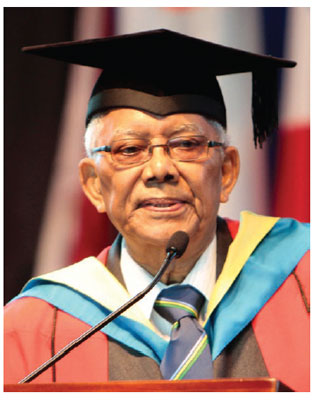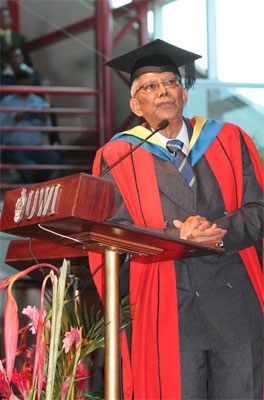|
December 2013

Issue Home >>
|

 
My sincere thanks, Chancellor, for conferring the honorary degree of Doctor of Science. Cardinal John Henry Newman, the founder of the Catholic university and my medical school in 1854, believed in a liberal university education. I gained admission to the medical school as a classics scholar in Greek and Latin without any knowledge of science. It is therefore a great honour for me to receive the Honorary Degree in science from The University of the West Indies. I would also like to thank Professor Teelucksingh for his kind remarks about the academic highlights of my life, starting with the alphabet.
Fellow medical graduands, I shall address you briefly on “A Life in Medicine.” Hippocrates said that “life is short, the art is long.” Congratulations on reaching the first milestone of your medical career. In June 1953, I graduated in Medicine from University College, Dublin with First Class Honours and three Gold Medals. I felt the same thrill that you are feeling today and I had the same high hopes for the future. My Professor of Medicine, DK O’Donovan, gave me some words of advice, which I wish to share with you:
- The patient comes first and foremost.
- The golden rule in medical practice is to put yourself in the patient’s place.
- Get a copy of Osler’s “Aeqanimitas” and let it be your guide.
Aeqanimitas is an essential quality of a good doctor. Osler defines it as, “coolness and presence of mind under all circumstances, calmness amidst storm and clear judgement in moments of great peril.”
The next five years of your internship and residency training will determine your future career, but clinical medicine and experience of the sick should remain the cornerstone of your medical practice. Critical thinking will be required to make appropriate use of the technological innovations in diagnosis and treatment as you continue to practise the Cartesian model of modern medicine taught in medical school. In this model, the human body is reduced to its parts—systems, organs, cells and molecules. The doctor examines the parts of the body and treats them separately. Bernard Lown, the inventor of the D.C. Defibrillator and one of my teachers in Cardiology at Harvard Medical School wrote as follows: “Doctors often do not minister to the sick person but concern themselves with malfunctioning biological parts—the brain, the heart, the kidneys etc. The art of listening is replaced by technological procedures. A sick person becomes the repository of malfunctioning parts and deranged regulatory systems that respond to some technological fix.”
 How can you become a good doctor? How can you become a good doctor?
Medicine is an art based on the medical sciences. To become a good doctor you must practise medicine with your head, your heart and your hands. Your main concern must always be the sick patient. You must have a scientific knowledge of medicine, technical skill in clinical examination and therapeutic procedures, and experience of sick patients whom you must treat with compassionate care. As doctors, we must be well trained in scientific medicine, to think in its terms and to command its technology, but we must also think equally well about the sick patient and his disease. In the words of Sir William Osler, “the knowledge base of medicine will increase, but its concerns—what doctors do—remain the same as in Ancient Greece 2,000 years ago, to prevent disease, relieve suffering and heal the sick.”
To become good doctors, we must study the natural history of disease in our patients, the course of their illness and the outcome of medical intervention. Medicine has become technically more complex and clinical decision-making more difficult. As doctors, you will have to define your role in society. Is the doctor still a healer and caregiver? Or are doctors entrepreneurs?
Today you are entering a noble profession with high ethical standards and a tradition of selfless service. You will have the responsibility to serve your fellow citizens in Trinidad and Tobago and to make the correct life and death decisions in emergency situations. One of your top priorities should be continuing medical education and a higher degree. Lord Dawson of Penn said that a doctor should be a student all his life. When he ceases to be a student, he dies.
The topic of my talk is “A Life in Medicine.” “Primum non nocere.”
“First of all do no harm” is the admonition from Hippocrates. Unfortunately, iatrogenic disease caused by doctors is not uncommon due to errors in diagnosis and treatment, complications of treatment and unnecessary intervention. Patients consult their doctors with three questions:
- What is the diagnosis?
- Can you cure me and relieve my symptoms?
- What will happen to me?
Effective communication is important. Listen to your patients. Explain your clinical findings and plan of treatment. Patients expect compassion from their doctor. Just before his death from prostate cancer, the essayist Anatole Broyard wrote, “I wish that my doctor will give me his whole mind for just five minutes, be bonded with me for a brief space, survey my soul as well as my flesh, to get at my illness since each person is ill in his own way. I would like my doctor to scan me, to grope for my spirit just as he gropes for my prostate. Without this recognition, I am nothing but my illness.”
“Guérir quelquefois, soulager souvent, soigner toujours.” —To cure sometimes, to relieve often, to care always. This will be the work of your life in medicine. The Chinese proverb says that a journey of a thousand miles starts with the first step. Today, you are taking the first step. The journey now starts.
Good luck and may God bless you in your future endeavours.
This is the address given to graduates of the Faculty of Medical Sciences, UWI, St Augustine, on October 26, 2013.

|





